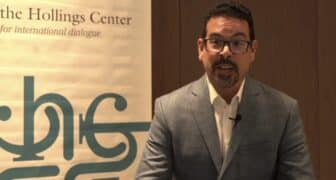How can efforts at climate change mitigation in MENA be integrated into U.S. policies?
Zeinab Shukar answers this question and elaborates further on the climate change mitigation efforts in MENA. The Center recorded this video during the Hollings Center’s dialogue conference Perceptions of U.S. Foreign Policy in a Changing Middle East. The dialogue looked at how perceptions of the region have changed as the United States has shifted its role in the region.
Zeinab Shuker received her PhD in sociology and political economy from the University of California, Riverside. Currently, she is an assistant professor of sociology at Sam Houston State University. Her research focuses on the political economy of the MENA region, with a special focus on Iraq’s past, present, and future. She has published and presented her work in top journals and think tanks in her field. Her research topics include the interaction between oil dependency, state-building, social movements, and governance in Iraq.
Currently, one of her projects examines the relationship between oil dependency, state capacity, and climate change in the MENA region. Social scientists argue that oil rentier economies experience the maldevelopment of their political systems. However, global climate change has increased the nature of political, economic, and social dysfunctions. Therefore, Shuker proposes to examine the factors that determine the response of governments of oil-producing countries to climate change. She argues that the state’s ability to adopt new economic policies due to changes in the climate depends on four factors. She lists those factors as state capacity, the presence and influence of environmental CSOs, regional stability, and the behavior of international oil corporations.


